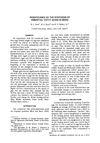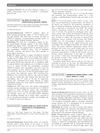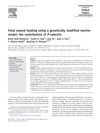 8 citations,
May 2021 in “Reproductive Biology and Endocrinology”
8 citations,
May 2021 in “Reproductive Biology and Endocrinology” Different levels of anti-Müllerian hormone can help diagnose polycystic ovary syndrome in women of different ages.
 3 citations,
March 2019 in “Post Reproductive Health”
3 citations,
March 2019 in “Post Reproductive Health” Testosterone replacement can help menopausal women with various symptoms, but should be used carefully and is not yet officially licensed in the UK for women.
 3 citations,
September 2014 in “Journal of obstetrics and gynaecology Canada”
3 citations,
September 2014 in “Journal of obstetrics and gynaecology Canada” Menopause often leads to lower sexual desire and discomfort during sex, but treatment should be personalized and only if it bothers the woman.
[object Object]  3 citations,
September 1975 in “Journal of animal science/Journal of animal science ... and ASAS reference compendium”
3 citations,
September 1975 in “Journal of animal science/Journal of animal science ... and ASAS reference compendium” Pigs can make some essential fats and don't need them all in their diet to grow and stay healthy.
 1 citations,
April 2024 in “Archives of disease in childhood”
1 citations,
April 2024 in “Archives of disease in childhood” Many children and teens referred to gender services receive hormone treatments, but more research is needed on their long-term care and outcomes.
 October 2022 in “Miscellaneous”
October 2022 in “Miscellaneous” A rare, non-cancerous ovarian tumor was successfully treated with surgery, improving the patient's symptoms.
 July 1996 in “Trends in Endocrinology and Metabolism”
July 1996 in “Trends in Endocrinology and Metabolism” The book is a valuable reference on androgenic disorders for professionals but not suitable for laypeople or medical students.
25 citations,
September 1977 in “Journal of Toxicology and Environmental Health” High doses of some contraceptive steroids cause health issues in dogs, but their relevance to humans is unclear.
8 citations,
September 2020 in “Journal of adolescent health” Gender-affirming care for youth remained essential during the COVID-19 pandemic, with telemedicine playing a key role.
 3 citations,
October 2022 in “International Journal of Impotence Research”
3 citations,
October 2022 in “International Journal of Impotence Research” Testosterone Replacement Therapy can improve sexual health in postmenopausal women with low sexual desire, but more research is needed on its long-term effects.
 2 citations,
April 2023 in “Pharmaceuticals”
2 citations,
April 2023 in “Pharmaceuticals” Testosterone therapy for postmenopausal women appears safe and may protect against heart disease, but requires constant monitoring and more research for long-term effects.

The study concluded that Frontal fibrosing alopecia can affect younger people, is often missed in men, and may be autoimmune-related.
[object Object]  69 citations,
September 1991 in “Journal of Surgical Research”
69 citations,
September 1991 in “Journal of Surgical Research” Understanding how fetal wounds heal could help improve healing in adults.
 109 citations,
December 2003 in “American Journal of Pathology”
109 citations,
December 2003 in “American Journal of Pathology” Fetal wound healing changes with development, affecting inflammation and collagen, which may influence scarring.
 10 citations,
April 2008 in “Journal of Pediatric Surgery”
10 citations,
April 2008 in “Journal of Pediatric Surgery” P-selectin is not the only factor that prevents scarring in fetal wound healing in mice.













